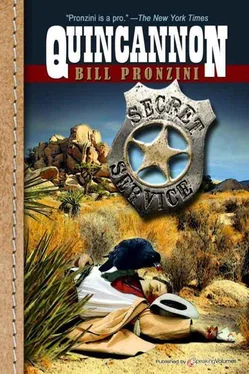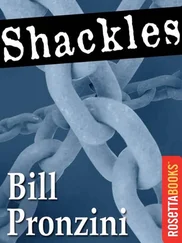Bill Pronzini - Quincannon
Здесь есть возможность читать онлайн «Bill Pronzini - Quincannon» весь текст электронной книги совершенно бесплатно (целиком полную версию без сокращений). В некоторых случаях можно слушать аудио, скачать через торрент в формате fb2 и присутствует краткое содержание. Жанр: Криминальный детектив, на английском языке. Описание произведения, (предисловие) а так же отзывы посетителей доступны на портале библиотеки ЛибКат.
- Название:Quincannon
- Автор:
- Жанр:
- Год:неизвестен
- ISBN:нет данных
- Рейтинг книги:5 / 5. Голосов: 1
-
Избранное:Добавить в избранное
- Отзывы:
-
Ваша оценка:
- 100
- 1
- 2
- 3
- 4
- 5
Quincannon: краткое содержание, описание и аннотация
Предлагаем к чтению аннотацию, описание, краткое содержание или предисловие (зависит от того, что написал сам автор книги «Quincannon»). Если вы не нашли необходимую информацию о книге — напишите в комментариях, мы постараемся отыскать её.
Quincannon — читать онлайн бесплатно полную книгу (весь текст) целиком
Ниже представлен текст книги, разбитый по страницам. Система сохранения места последней прочитанной страницы, позволяет с удобством читать онлайн бесплатно книгу «Quincannon», без необходимости каждый раз заново искать на чём Вы остановились. Поставьте закладку, и сможете в любой момент перейти на страницу, на которой закончили чтение.
Интервал:
Закладка:
“No.”
“Then why? Is it because of the woman I resemble?”
The conversation had become too personal; her questions made him feel ill at ease, brought Katherine Bennett back into his consciousness. He said, “I had better leave now. There are things to be done.”
“Yes. Of course.”
He turned for the stairs, stopped after two paces, and faced her again. “How late do you expect to be here tonight?”
“Until about six.”
“I wonder… if I came back then, would you consider taking supper with me?”
The faint smile again. “Do you intend to kiss me again afterward?”
“No,” he said. And then, on impulse, “Does it offend you that I find you an attractive woman?”
“I should be offended if you didn’t.”
He laughed and so did she, spontaneously, and his feeling of awkwardness and unease vanished. She had a fine, rich laugh; he thought that it would be good to hear it more often. “At six then, Miss Carpenter?”
“Very well, Mr. Quincannon — at six.”
“John, if you will.”
“Sabina.”
Downstairs, he switched the sign in the door glass so that it read Open facing outward, then unlocked the door and went out. The meeting with Sabina Carpenter had gone far better than he had anticipated. He felt almost cheerful, almost human again — the first time he had experienced such normal feelings since Virginia City. He neither needed nor wanted a drink, and that too was an odd new feeling.
On Washington Street he went down across the creek toward Cadmon’s Livery. It was still his intention to rent a horse, but no longer to visit Oliver Truax; he was convinced, after his talk with Sabina, that Truax was much too involved in his own illegal enterprise to be mixed up in the coney game. Quincannon’s aim this time was the Rattling Jack and any sort of flaw in its fortress-like defenses.
But what he saw when he neared the livery diverted that aim for the present and gave him a different purpose. A yellow Studebaker freight wagon was drawn up in front of the entrance, its deep bed covered with canvas — the same wagon and the same team, he was sure, that Jack Bogardus had brought from Truax two days ago. Its burly driver was up on the high seat, engaged in some sort of argument with the liveryman named Henry. The man’s slablike face was turned so that Quincannon could see it and the thatch of fiery red hair that topped it.
Both were familiar, unmistakably so. The driver of the Rattling Jack freight wagon was the man who had murdered Quincannon’s informant, Bonniwell, in San Francisco.
Chapter 16
It was doubtful the red-haired man had got a good look at him in return that night, shielded as he’d been by the rain and darkness, but Quincannon turned quickly aside and detoured over toward the blacksmith’s shop beyond the livery. He needn’t have worried. The redhead was intent on his argument with Henry and for the moment oblivious to his surroundings. Quincannon stopped under the drooping branches of a willow that fronted the blacksmith’s, directly behind the wagon and close enough to overhear what the two men were arguing about.
“How the hell you expect me to get this ore down the mountain with a spavined horse and a cracked doubletree?” the redhead was saying. “I wouldn’t make it half way to the Poison Creek station.”
“Is that my fault?” Henry said. “I told you, Griswold, I ain’t got a doubletree for that kind of rig. Why don’t you try Tully’s place?”
“I already did on the way in. Can’t you make one?”
“Couldn’t Tully?”
“Said it’d take him all afternoon.”
“Well, it would me too.”
“I tell you, I got to get this load to Boise,” the redhead, Griswold, said. “Listen, how about repairing the doubletree. You can do that, can’t you?”
“I suppose I could,” Henry said grudgingly. “Piece of scrap iron might do it. But I couldn’t give you any guarantee she’d hold up.”
“I ain’t asking for any guarantee.”
“Hell, I don’t know. I got other work to do…”
Griswold said, “I’ll pay you an extra twenty if you get me on the road by two o’clock.”
“Twenty dollars, you say?”
“A brand new greenback. Well?”
“All right, then. Pull the wagon inside and I’ll see what I can do.”
Henry stepped back and the red-haired man brought the team around, drove the Studebaker up the ramp and into the shadowed interior of the livery. When Henry had gone in after it, Quincannon left the shade of the willow. He wanted a look at the “ore” in the wagon, but he was not about to get it with both Griswold and Henry in there. What he had to do was find a way to get them out of the building for a time.
He moved along the south wall, around to the rear. There was a back entrance, he saw, a single door that he surmised would lead in among the horse stalls. He stood for a moment, scanning the area. Out here were a good-sized manure pile, some patches of dry sage and grass, the skeletons of two abandoned wagons, and more sagebrush climbing the slope beyond. There was nobody around. And once he had taken half a dozen steps toward the manure pile, the entrance to the blacksmith’s, from which he could smell the sharp odors of burning coal and hot metal, was no longer visible.
The droppings around the edge of the pile were dry; quickly, using the side of his boot, he scraped some of them into a separate mound in a big patch of dead grass, twenty feet or so from the back wall of the livery. Then he pulled up handfuls of sage and grass and added them to the mound. The wind was gusty, blowing down from the higher elevations; he put his back to it, so as to shield his hands, and scraped a match alight. Within seconds the dry grass and sage began to blaze. And when the droppings caught, the smoke that poured up from the fire thickened and was wind-driven against the livery.
Quincannon went to the rear door, pounded on it urgently, and yelled, “Firel Firel”
Inside, voices and running steps responded. He ducked around the north corner, ran as fast as his bruised ribs would allow to the front entrance. From there he could see the Studebaker wagon and the floor space around it: there was no sign of Henry or the redhead. The rear door must be open — he could smell smoke from the fire, see trailing wisps of it in the lamplit interior. At a distance, someone — it sounded like Henry — was cursing inventively.
Quincannon ran up the ramp, across to the tailgate of the Studebaker, and loosened one of the ropes that secured the canvas covering the bed. Under the canvas, he saw when he lifted the corner flap, were a dozen or so wood-slat crates. He tugged at the top of the nearest crate, found that it had been nailed down. But there was finger space between two of the slats; he got a grip on one and wrenched once, twice, three times before a nail pulled loose and part of the slat splintered off with a loud snapping noise.
He jerked his head up to look toward the rear. But the sound had been lost among several others. The horses back there had smelled the fire and were making nervous snorts and thumpings in their stalls; the drays harnessed to the Studebaker were likewise being noisily skittish. Outside Henry was still yelling. It was plain that he and Griswold were still occupied in trying to put out the fire.
Quincannon shoved his hand down through the broken section of the box lid, felt straw packing, and burrowed through it. His fingers touched something — paper, a small bundle — and then caught hold of it and dragged it out into the light. The bundle was of brand new greenbacks, twenties judging from the top one, tied with thin twine. He pushed it into his coat pocket, dropped the canvas and retied the rope, and hurriedly backed away from the wagon.
Читать дальшеИнтервал:
Закладка:
Похожие книги на «Quincannon»
Представляем Вашему вниманию похожие книги на «Quincannon» списком для выбора. Мы отобрали схожую по названию и смыслу литературу в надежде предоставить читателям больше вариантов отыскать новые, интересные, ещё непрочитанные произведения.
Обсуждение, отзывы о книге «Quincannon» и просто собственные мнения читателей. Оставьте ваши комментарии, напишите, что Вы думаете о произведении, его смысле или главных героях. Укажите что конкретно понравилось, а что нет, и почему Вы так считаете.












